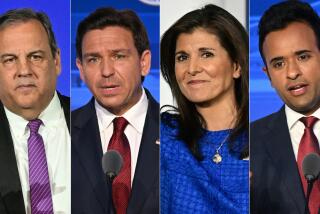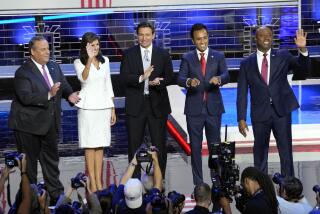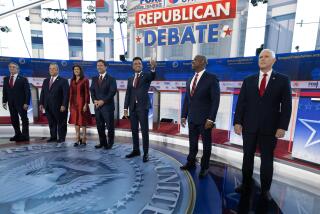British candidates go Round 3
- Share via
Reporting from London — In sometimes combative fashion, the three candidates for British prime minister on Thursday verbally poked and prodded one another on economic issues while trying their best to capture voters via a third and final televised debate.
As with two previous debates, no candidate appeared to suffer a devastating loss, observers said, each somewhat effectively using the public forum so familiar to American voters but long resisted by the British political system. Certainly, each candidate clearly realized the importance of making a strong impression on television before parliamentary elections May 6 or they risk losing votes.
“Economies in Europe are in peril, and there is risk of dragging us into recession, said Gordon Brown, the incumbent from the ruling Labor Party. “I’m determined that nothing will happen in Britain that will put us back in that position.”
David Cameron, the Conservative Party leader, used his steely and articulate assertiveness in declaring that Britain must take many steps including developing its manufacturing sector and reforming financial regulations.
“We have to reward work and tackle welfare dependency,” Cameron said.
Candidate Nick Clegg, the head of the smaller Liberal Democrats who received top marks from many viewers after the first debate and again relied on natural composure and appeal, said Britain’s poorest workers should receive tax breaks even as social services are protected.
Cameron and Clegg clashed on immigration, with Clegg calling for an amnesty to draw out illegal and criminal elements against Cameron’s idea of a cap on immigration numbers.
Seasoned analysts have viewed the latest electoral campaign as especially engaging, partly because of the candidates and partly because of television coverage and the influence of social networking technology such as Twitter.
“It’s the most interesting election Britain has had for 50 years,” Charlie Beckett, a politics and media analyst at the London School of Economics, told reporters Thursday.
Clegg’s surprise performance in the first debate two weeks ago, which he followed eloquently in the second last week, has boosted his party’s image.
Brown, the former chancellor responsible for the country’s finances under Tony Blair’s government, has trailed in the polls and the personal popularity stakes.
On Thursday, he was fresh from a gaffe a day earlier in which, while wearing a live microphone, he described Gillian Duffy, 66, a declared Labor voter who had raised the issue of immigration, as a “bigoted woman.” He later visited Duffy’s home to apologize.
Brown’s campaign has focused on the economy and resurgence of Britain as an economic force in Europe.
“I believe that as people focus on the economy and on the public services, they will see that Labor has got the best plans for the future,” he told the Financial Times Wednesday.
“The frustration of this election, let’s be honest, is that it’s being reported on style and on personality and on individual maneuvering about what sort of government they want after the election,” he said. “I think the debates have influenced the campaign in the sense that they’ve focused on individuals.”
During the debates, the three candiates have sparred on issues including the economy, immigration, defense and foreign policy. Critics have taken them all to task for failing to provide the facts and figures behind their ideas for reducing Britain’s massive budget deficit.
Becky Emms, a 21-year-old studying ancient and medieval history, said before the debate that she favored a candidate who might help first-time job-seekers like her.
“I really like the TV debates,” she said later. “I can spare an hour and a half to get to know the candidates and their issues.”
Stobart is a news assistant in The Times’ London Bureau.
More to Read
Sign up for Essential California
The most important California stories and recommendations in your inbox every morning.
You may occasionally receive promotional content from the Los Angeles Times.













